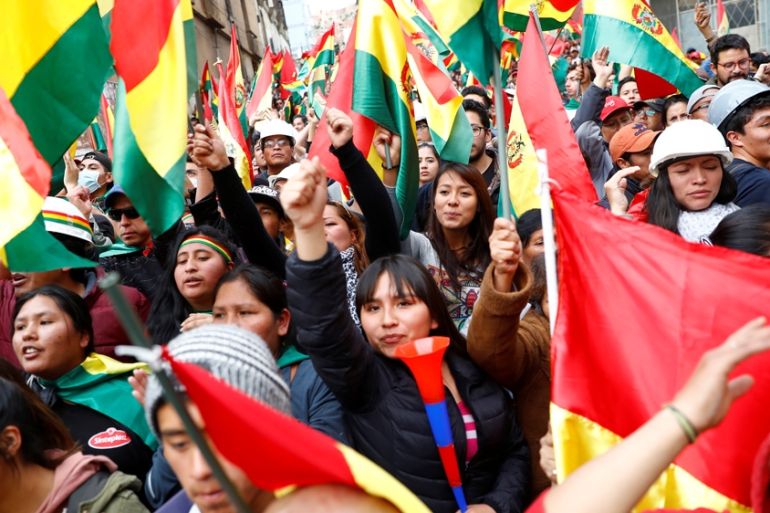Bolivia military chief says army ‘will not confront people’
Amid unrest over President Morales’s re-election, military calls for resolution of crisis, says it will guarantee unity.

Bolivia‘s military chief has said the armed forces will not “confront people” while ensuring that peace is maintained amid nationwide unrest as President Evo Morales‘s government faces increased pressure to resolve a weeks-long standoff over the country’s disputed election.
In a statement on Saturday, commander in chief General Williams Kaliman said the military’s role was to guarantee unity in the country, adding the “current problems taking place in the political sphere must be solved … before reaching irreversible [conclusions]”.
Keep reading
list of 3 itemsBolivia’s Morales fumes as protesters attack mayoral ally
Thousands of Bolivians march over disputed election
Morales, Latin America’s longest-standing leader, won an election on October 20, but a delay of nearly a day in the vote count sparked accusations of fraud and led to protests, strikes and roadblocks.
On Friday night and Saturday, local television showed police in several cities marching alongside protesters in apparent acts of disobedience and joining chants regularly used by the opposition, while some police guards also abandoned their posts outside Bolivia’s presidential palace.
Morales, who was not at the palace at the time and appeared later at a military airfield outside the capital, La Paz, urged police to “preserve the security” of Bolivia and obey the rules.
The foreign ministry released a statement saying some police officers had “abandoned their constitutional role of ensuring the security of society and state institutions”.
In a Twitter post in the early hours of Saturday, Morales accused the opposition of organising a coup.
At a news conference later at the base, the president appealed to Bolivia’s political factions to hold talks. He said the four parties that received the most votes in the nine-candidate election should sit down with “an open agenda to pacify Bolivia”.
Morales said he would also invite to the talks international organisations including the Vatican, the United Nations and the Organization of American States (OAS) which is conducting an audit of the election.
Carlos Mesa, the main opposition leader and a former president who finished second in the polls, rejected the suggestion to hold talks.
“I have nothing to negotiate with Evo Morales, who has lost all grip on reality,” Mesa said.
Meanwhile, demonstrators on Saturday burst into the offices of the media outlets Bolivia TV and Radio Patria Nueva and forced employees to leave, accusing them of serving the interests of Morales, AFP news agency quoted Ivan Maldonado, director of Radio Patria Nueva, as saying.
Morales denounced the seizure. “They say they defend democracy, but they behave as if they were in a dictatorship,” he wrote on Twitter.
A radio station run by a farmers’ union was also seized by protesters, Morales said.
The president also accused members of the opposition of setting fire to the home of his sister in the southern city of Oruro as part of what he called an effort to overthrow him.
‘Complicated moment’
Jorge Dulon, a political analyst at the Catholic University of Bolivia in La Paz, told Associated Press news agency that Morales faces “the most complicated moment” in his 14 years in power and warned that the situation could deteriorate.
Separately, a number of left-leaning leaders in the region backed Morales on Saturday, including those of Venezuela, Cuba, Mexico and Argentina’s president-elect Alberto Fernandez.
“We denounce before the world the attempted coup d’etat in progress against the brother President Evo Morales,” Venezuelan President Nicolas Maduro wrote on Twitter.
The European Union issued a statement on Saturday calling for demonstrators to remain peaceful, saying a solution “can be achieved through peaceful negotiations”.
Michael Kozak, US assistant secretary for Western Hemisphere affairs, wrote on Twitter: “Bolivian citizens deserve credible and transparent elections that they can trust to represent their will. We urge all actors to avoid violence and ensure that the forces of public order continue to exercise restraint.”